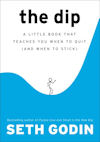The Pace of Change
Five months ago I bought a Kindle. It was novel and fun. People next to me on airplanes asked about it because they hadn’t seen one before. I read lots of books with it and I loved it.
I received my iPad yesterday. Within three hours I put my Kindle up for sale on eBay. Here’s the link. Amazon makes a free Kindle app for the iPad, giving me access to all my Kindle books on my new device. And the iPad can do a zillion things my Kindle can’t. (I’m writing this on my iPad.)
I have never felt the pace of change so whiplash fast before. What a challenge for technology companies, and for all of us, to succeed in a world of change at breakneck speed. I actually feel bad for Amazon and Jeff Bezos today. I think Kindle took longer to develop than it took to get seriously trumped. But the iPad will be trumped soon enough too. There is no pause button on this race.
I believe in accepting reality. Reality is, the pace of technological and economic change is faster than ever and it’s only going to get faster still.
To some degree this reality re-sorts the skills needed to succeed. Willingness to risk, to fail, to change on purpose, to end things and start new ones are all valuable skills in a change-dominated economy.
Change is scary. I think there are rewards to those leaders who embrace the pace in spite of the fear.

